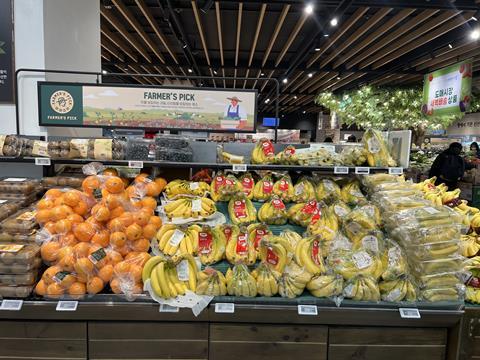Government says ten imported fruits will remain tariff-free until the end of September as it continues fight to curb food price inflation
The Korean government has announced it will extend tariff exemption for ten imported fruits until the end of September.

Bananas, pineapples, mangoes, grapefruit, kiwifruit, avocados, mangosteens, cherries, durian and mandarins will all benefit from zero import duty until 30 September.
The tariff exemption was due to expire at the end of June, but Korea’s deputy prime minister and finance minister Choi Sang-mok announced plans to extend the programme last week as part of the government’s efforts to combat food price inflation.
Speaking at a price-related ministers’ meeting last Tuesday (4 June), Choi said consumer prices, a key gauge of inflation, rose 2.7 per cent in May versus the previous year. While this marks a slight decrease from the previous month (2.9 per cent) after peaking at 3.1 per cent in March, he said the battle to curb inflation was far from over.
“The inflation rate has slowed to 2 per cent, but the overall price level has heightened to cause difficulties in the lives of ordinary people,” said Choi. “In order to stabilise the living and shopping-cart prices, all companies must work together.”
The government announced measures to extend tariff exemption on 28 imported fruits, including fresh and frozen items. It also said it would apply tariff reductions to 12 food ingredients, including sugar and coffee beans, with a quota-based tariff adjustment introduced for seven more food materials, such as butter and whole milk powder.
June Choi, managing director of major fruit importer Soo Il Commerce, told Fruitnet the tariff exemption would see much greater volumes of fruit imported to Korea in 2024, tipping them to reach “record highs”.
However, the impact of the tariff exemption might be lower in the second half of the year compared with the first, according to Hyojun Kim, senior sourcing manager of Shinsegae Food.
“Import volumes of bananas, pineapples and mangoes will expand, similar to last January to June,” said Kim. “Almost all imports of avocados (Peru), cherries (the US, Canada and Chile) and kiwifruit (New Zealand) are already tariff-free, so their volumes should be very similar to previous years.
“Volumes of mangosteen and durian are very small in the Korean market. Furthermore, mandarins are not available until September.”
Demand for grapefruit has been dwindling in Korea over the past several years. After peaking at 25,010 tonnes in 2015, volumes declined to 13,247 tonnes last year. However, import volumes have jumped in recent weeks, driven by the tariff exemption, according to Kim.
“Many importers in Korea tried to import a lot of South African grapefruit before the end of June to take advantage of the tariff exemption,” he said. “If the shipments arrive before the 1 July, they don’t need to pay a 30 per cent tariff. But now the tariff exemption has been extended, and excess volumes are arriving this month.”
Soo Il’s Choi confirmed that large volumes of South African grapefruit had been coming into the market. Arrivals as of Week 24 (commencing 10 June) had already exceeded the total import volume for 2023. He said Australian oranges were also set to arrive in large volumes from 25 June. “It looks like there is going to be an oversupply,” said Choi.
Oranges and grapes are not included in the list of tariff-exempt fruits.



